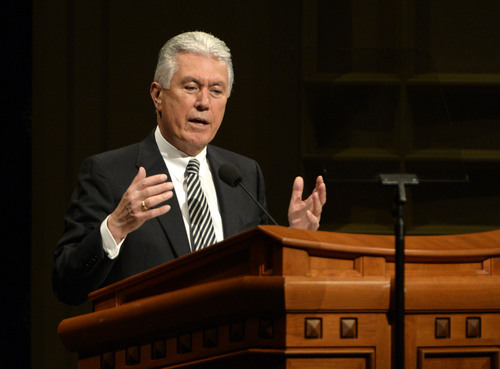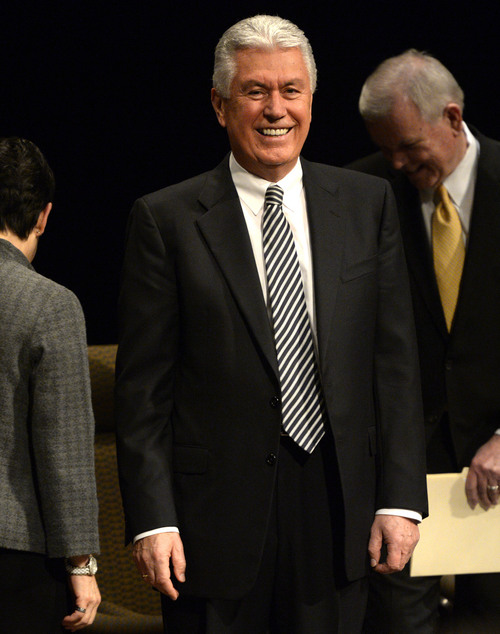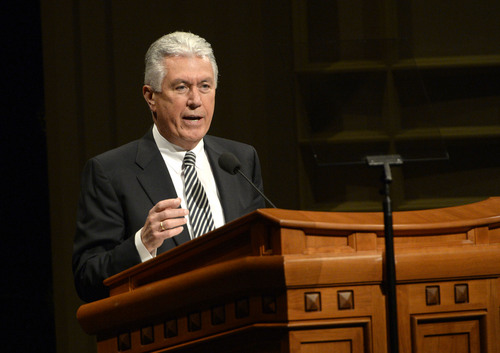This is an archived article that was published on sltrib.com in 2014, and information in the article may be outdated. It is provided only for personal research purposes and may not be reprinted.
Shortly before leaving for my LDS mission in 1973, a coworker tried to get me to see the light by giving me the bloody details of the Mountain Meadows Massacre.
In 1857 immigrants traveling in a wagon train were slaughtered near Cedar City. The actual perpetrators of the massacre had long been debated but the truth was finally coming out. Jordan was extra happy about that.
Jordan: "And it was the Mormons who killed them."
Me: "Yeah, I know. Two of my great-great-grandfathers helped."
The fact that I already knew what had happened and was related to some of the murderers didn't sit well with Jordan. How could I possibly still go on a mission knowing that stuff about the church?
That part was easy: It had nothing to do with me.
While troubling, Mountain Meadows didn't surprise me. I already knew a few Mormons so steeped in church obedience that with the right prompting they'd probably do it again. As I saw it, my whole job was to make sure I wasn't one of them.
I feel the same way about polygamy, the one-time ban on blacks in the priesthood and a bunch of other troublesome stuff in our past. I've always believed people are bad, including (and sometimes especially) people who are trying to be good.
I bring this up because in a recent address to a group of historians, President Dieter F. Uchtdorf, second counselor in the LDS First Presidency, encouraged Mormons to maintain hope in the face of troubling explanations.
When The Tribune reported on it, I started getting feedback from readers eager to prove to me that the church I attend isn't "true." Our history proves it.
Email: "The shame alone should tell you what you need to do, Mr. Kirby. Get out now."
Me: "OK, let me think ab...no."
I'm Mormon. It's who I am. Yeah, there are things I don't like about my church but there are things that I do.
It helps that I'm comfortable being my kind of Mormon. It helps me handle people who think they have a better idea what I should do than me.
When I read the story about Uchtdorf's remarks, my first thought was who better than him to give such advice?
Uchtdorf belongs to a group of people with a dark and horrible past. And it isn't Mormons. He's German. He's probably spent his entire life hearing about the Holocaust, genocide on an industrial scale.
So even though he's now a naturalized U.S. citizen, I wonder why he didn't renounce his German heritage? He doesn't have to be German.
More to the point, why would a guy descended from such horribleness actually volunteer to serve in the Bundeswehr (post-war German army)?
Even though we belong to same church, Uchtdorf and I don't exactly travel in the same circles, so I have to guess about this. I'd guess he's proud to be German and have served as a fighter pilot in the West German Air Force.
Should he hang his head in shame? Or does he tell himself — rightly so — that what Germans did a long time ago doesn't change the kind of person he is today. Maybe sticking around was the best thing for him to do.
Makes sense to me. I don't want to be something else. I'm comfortable being where I am.
That doesn't sit well with people both in the church and out who arrogantly presume to tell me what I should do. Fortunately for me, the answer is the same for both groups. All else aside, I'd probably stay Mormon just to piss you off.
Robert Kirby can be reached at rkirby@sltrib.com or facebook.com/stillnotpatbagley.







